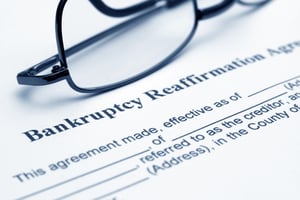 When a person files a chapter 7 bankruptcy case in Minnesota, they can choose what to do with their secured debts such as home mortgages and car loans.
When a person files a chapter 7 bankruptcy case in Minnesota, they can choose what to do with their secured debts such as home mortgages and car loans.
A bankruptcy discharge terminates a person’s legal responsibility to pay all of their debts, whether those debts are secured or unsecured, absent certain exceptions (i.e. most tax debts, criminal fines, child support, etc.). Even though the debtor (what you call a person who files a bankruptcy case) no longer has any legal responsibility to continue paying their secured debts after receiving their discharge, secured creditors, such as car lenders and home mortgage lenders, retain a lien on the collateral (the car or home used to secure repayment of the debt) until the debt is completely paid off. In order for the debtor to keep their car or home, they must continue making payments on the debt.
The Bankruptcy Code provides that a debtor may opt to keep the property by signing a reaffirmation agreement, which essentially renews their promise to repay the secured loan. When a debtor signs a reaffirmation agreement for a car or home loan, that secured debt is, in effect, taken out of the bankruptcy, and the debtor once again becomes personally liable for the debt despite receiving their discharge of their other debts. Signing a reaffirmation agreement assures that, so long as the debtor continues making their payments, the secured lender cannot repossess their car or foreclose on their home.
In Minnesota, debtors are given special legal protections in regards to their home and, so long as the debtor continues making their mortgage payments, the debtor’s home cannot be foreclosed upon simply because they do not sign a reaffirmation agreement. With cars, however, it is not quite as simple. A car lender may repossess a debtor’s car if they do not sign a reaffirmation agreement, even if the debtor is current on payments. Despite this risk, it is rarely in the debtor’s best interest to sign a reaffirmation agreement on a car loan. Why? Most car lenders will simply allow the debtor to keep the car so long as they keep making payments. Very few creditors, such as Spire Credit Union or HiWay Credit Union will actually repossess the debtor’s car if they don’t sign a reaffirmation agreement, regardless of whether the debtor is current on payments.
Alternatively, if a debtor signs a reaffirmation agreement, they will often find themselves in a worse financial position down the road. While signing a reaffirmation agreement may temporarily benefit the debtor by ensuring that they will keep the car so long as they stay current on the loan, the downside of signing a reaffirmation agreement is that the debtor retains personal liability on the debt. As a consequence, if the debtor ends up defaulting on payments, or for whatever reason decides they no longer want the car, they are stuck with the debt just as if they never filed a bankruptcy case. In such a circumstance, the lender may repossess the car and will likely resell the car to repay a portion of the loan. Very often, the amount of money the lender recovers from the sale of the car is much less than the amount the debtor owes If the debtor had signed a reaffirmation agreement during their bankruptcy case, the debtor is still liable for this outstanding “deficiency balance.” The lender may collect on this outstanding balance by suing the debtor, getting a judgment, and enforcing the judgment (i.e. through wage garnishment) the same as if the debtor had not filed for bankruptcy. Cars quickly deteriorate and depreciate in value. For this reason, it is most often the case that the debtor is not better off in the long run by signing a reaffirmation agreement, and should just continue to make payments on their vehicle until such time they wish to voluntarily surrender, or return, the car to the lender on their own terms when it makes more economic sense to find a replacement vehicle.
CALL NOW FOR A FREE STRATEGY SESSION FROM A MN BANKRUPTCY LAWYER AT LIFEBACK LAW FIRM
An experienced bankruptcy attorney can discuss reaffirmation agreements in greater detail and make a competent assessment of whether signing a reaffirmation agreement makes sense given one’s unique financial circumstances. LifeBack Law Firm is here to help advise Minnesotans who are thinking about filing for bankruptcy with offices around the Twin Cities as well as greater Minnesota. LifeBack Law Firm has a new office located at 370 Selby Ave, Suite 224, St. Paul MN 55102. Visit us there, or online, at lifebacklaw.com!


